We usually rely on popular search engines like Google or Bing, but that's just the tip of the iceberg. Beneath the surface lies a vast world known as deep search or the invisible web. But what exactly is the Deep Web? Why should you research and use Deep Web search engines? Furthermore, which search engine should you use? Let's find out.

This layer of the World Wide Web contains password-protected websites, private databases, confidential academic research, and much more that are not typically indexed by popular search engines. A Deep Web search engine can help you do just that.
DEEP WEB VS. DARK WEB
While the term "Deep Web" is often used interchangeably with "Dark Web," they are two distinct entities. Simply put, the Deep Web allows you to delve into untapped resources that traditional search engines may not be able to index. This may include inaccessible legitimate information, such as academic databases, government resources, cloud storage drives, company internal networks, and more.
The Dark Web is a darker subsection of the Deep Web and is often associated with illegal activities and shady markets. It's a collection of deliberately and proactively hidden sites that can only be accessed through special browsers. Data is encrypted and transmitted across multiple nodes, allowing users to remain anonymous.
Top 10 Invisible Search Engines on the Web
1. Duckduckgo – The Best Service for Dipping Your Toes into the Deep Web
Prepare DuckDuckGoKnown for its privacy-focused approach, it's a valuable tool for exploring the Deep Web. While it primarily functions as a search engine, it can also help you view some Deep Web content.
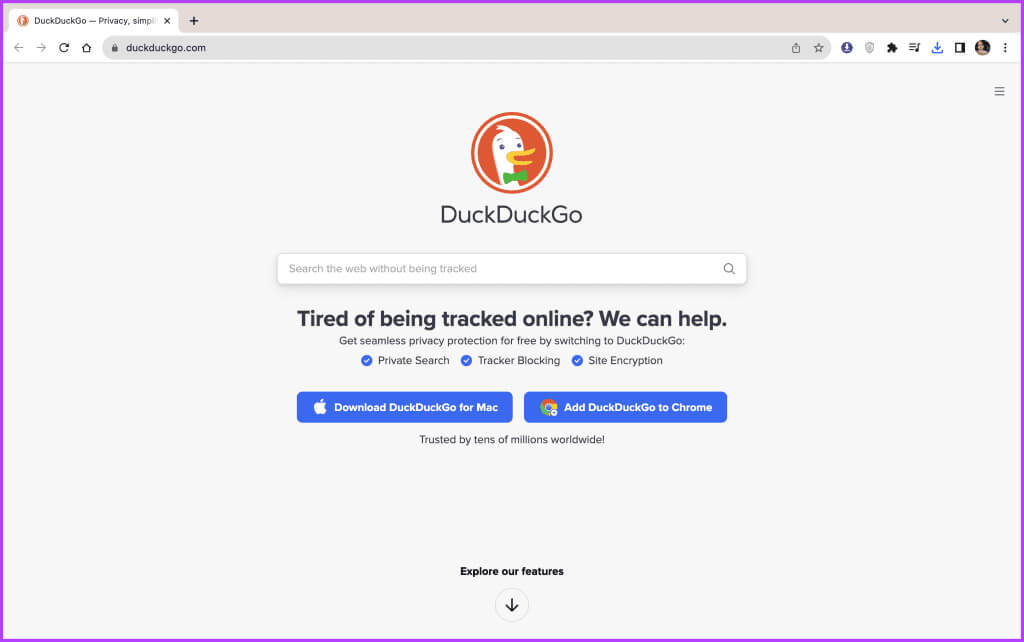
The browser sets no limits, generating results from over 400 individual sources, from popular search engines to crowdsourced sites. Best of all, DuckDuckGo respects user privacy and does not track or collect personal data.
Therefore, it's a secure way to access the deep web without compromising your anonymity. Furthermore, almost anyone can use and manage its user-friendly interface.
2. The Wayback Machine – The best place to search old web archives
The Wayback Machine, also known as the Internet Archive, houses over 100 terabytes of data and copies of over 361 billion web pages. While you can search for the most recent information via regular search engines, this engine is a great resource for accessing historical versions of websites.

Although users can upload and download digital materials to its dataset, it primarily collects data from its own automated web crawlers. However, it doesn't work like a regular search engine, meaning you can search content randomly. You'll need to provide the URL of a specific web page to access its older versions.
So, while it's not a typical deep web search engine, it can be used to uncover removed or modified content on the surface web. It's a particularly essential tool for researchers and historians looking to track the evolution of websites over time.
3. Pipl – The Best People Search Space on the Deep Web
You may have Googled yourself at times, but have you ever searched for yourself or someone else on the deep web? There can be a huge difference in what you find. Try Pipl if you don't believe us. Pipl is a deep search engine that specializes in finding people and their online presence.
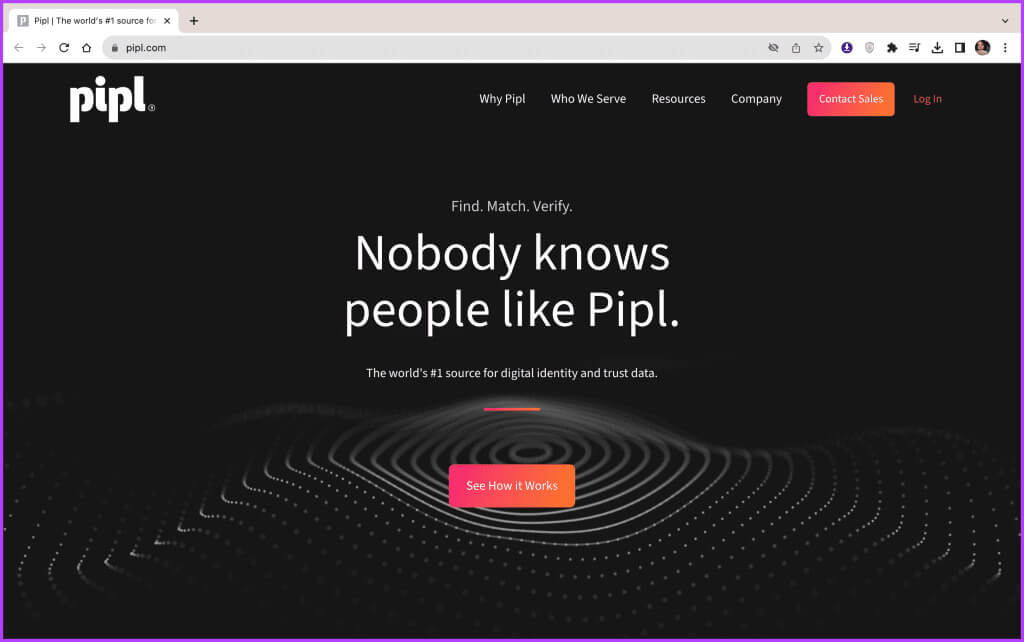
It searches databases, member directories, court records, and more to share information relevant to a person. Simply put, it pulls information from the deep web, something traditional search engines can't do.
Thanks to this, you can identify the people behind any email address, phone number, or social media username. This tool is especially useful for organizations searching for potential employees or vice versa.
4. Ahmia – A safe space to access the Dark Web
Ahmia is a bridge between the deep web and the dark web. Although Ahmia is a dark web search engine, it is one of the few dark web search engines available on the regular web. Designed specifically for the Tor network (a dark web browser), it allows you to search through hidden services.

However, be aware that you may need the Tor Browser to open some links and results. It's an excellent choice for users interested in exploring the deeper, hidden aspects of the internet and exposing themselves to the associated risks.
Users can also contribute to the source code of this open-source search engine. The best thing about this search engine is that it doesn't support offensive material. Furthermore, if you find any such material in its index, you can report it for faster removal.
5. Directory of Open Access Journals – Best for Researchers and Academics
DOAJ, or Directory of Open Access Journals, is an indispensable resource, especially if you're looking for academic papers, journals, reports, etc. It gives you access to scholarly articles and research papers that may not be available anywhere else.

It contains over 19000 journals and over 8.9 million articles on various topics and subjects. Most of these are often relegated to the Deep Web due to their specialized and confidential nature or are locked behind paywalls.
While you can access some free articles on Google Scholar as well, DOAJ is a bit longer. It indexes a broader library without any article processing fees. However, if you are using an article for scholarly purposes, it is recommended that you provide appropriate references and payments where due.
6. USA.gov – An invisible website for searching government-related documents
USA.gov is the official portal for online U.S. government resources. While it may not be a traditional deep web search engine, it is a gateway to a repository of all public domain information and services.

You can access a wide range of government information and documents about agencies, laws, states, jobs, tax information, etc. The portal can also help you access public materials related to federal, state, local, or tribal government agencies.
Furthermore, it's safe to say that the content here may not be indexed by commercial search engines. It's intended to give users a better understanding of government services and is a valuable resource for citizens seeking government-related information.
7. The Hidden Wiki – Wikipedia Dark Web
The Deep Web version of Wikipedia is a directory of websites on the Tor network. One can access the directory of various onion sites by visiting its official website. Although you may need the Tor browser to visit some onion pages,

However, you should be mindful of this resource, as it includes both legal and illegal aspects. There may be legal and ethical implications when browsing this site.
Agreed, this can be a great starting point for discovering what the Dark Web has to offer. However, available websites such as whistleblowing tools may or may not be legal in your country, so proceed with caution.
8. WWW Virtual Library – The Oldest Catalog on the Web
This is a cross between the Wayback Machine and the Directory of Open Access Journals. Dating back to 1991, it is one of the oldest directories of electronic texts and information sources. Interestingly, this space was created by Tim Berners-Lee, the creator of the World Wide Web.
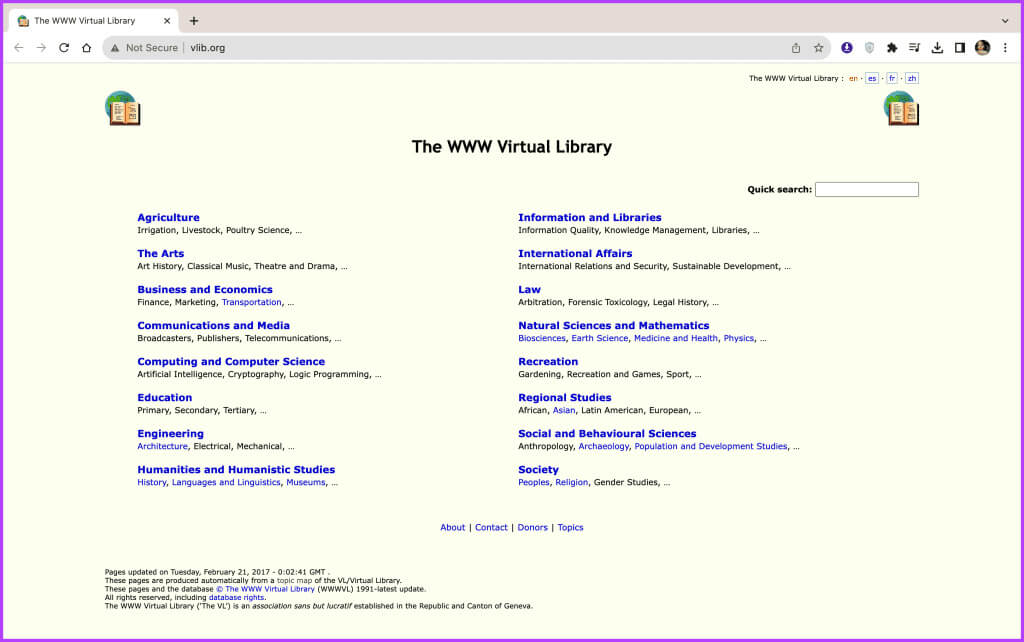
It currently brings together all the important links from various sectors, including computer science, engineering, education, natural sciences, law, arts, society, and culture. Furthermore, the WWW Virtual Library is a curated collection of Internet resources organized by volunteers.
Simply put, it provides access to deep web content that may not be easily discovered through mainstream search engines. Furthermore, this library is an excellent starting point for academic and research deep web searches.
9. WorldCat – Deep Web Database for Libraries
You can assume that WorldCat is a search engine dedicated to unique materials and resources available only in libraries. It houses an extensive online catalog of library collections worldwide and connects you to the catalogs of thousands of libraries.
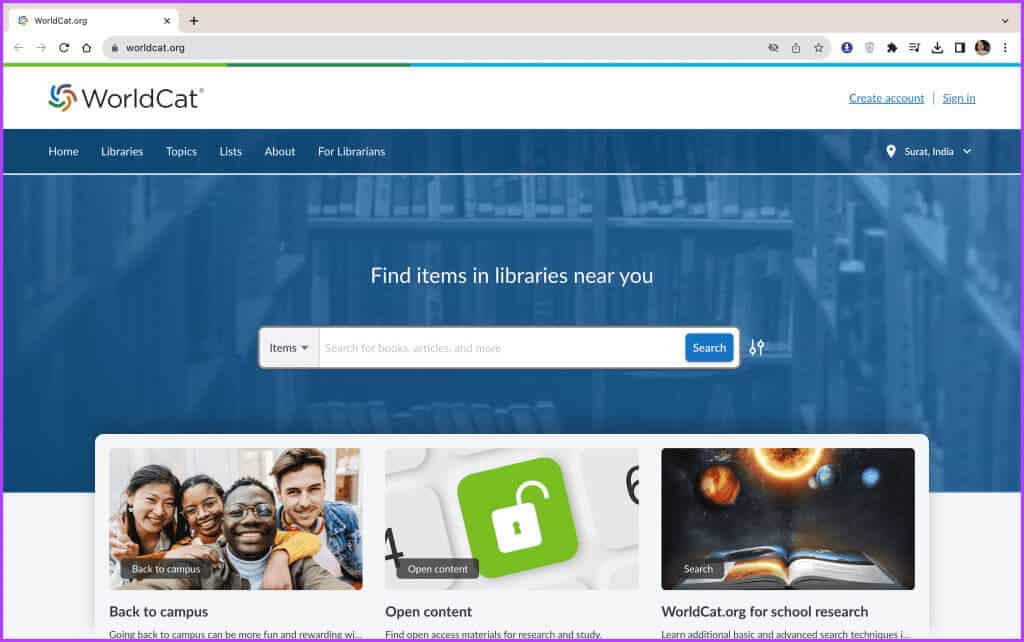
So, instead of searching individual libraries for the resources you need, you can browse and access them from a single search box. Whether it's books, magazines, articles, images, e-books, audiobooks, CDs, DVDs, maps, records, or dissertations, you can find them all in this search engine.
Although not a deep web search engine in the traditional sense, WorldCat can help users uncover academic and research materials that may not be accessible through standard search engines.
10. Elephand – A search engine dedicated to historical newspapers
While it serves as a great tool for scholars and researchers, it will also be useful for genealogists and family historians. Why? Elephind is a specialized deep web search engine that can retrieve historical newspaper archive data from anywhere in the world.
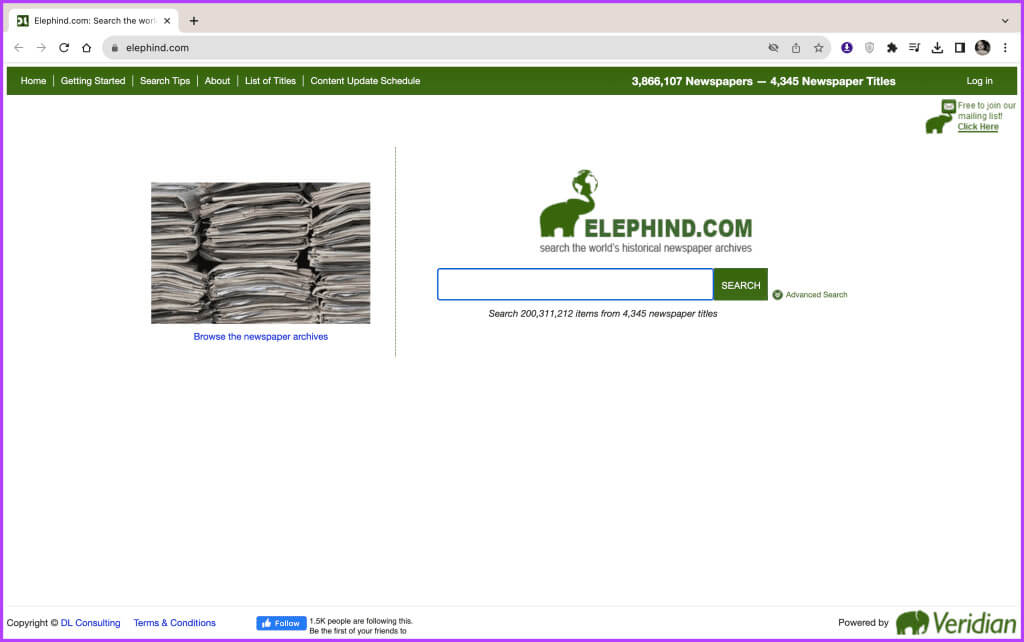
You'll have access to a wide range of digital newspapers. But that's not all. It also allows you to search multiple newspaper websites simultaneously without spending a penny. Since it displays the website URLs of many newspapers available only on the deep web, you can go directly to those sites by clicking on the link.
You should know about underground web search engine
In conclusion, the deep web is a hidden treasure trove of information. However, only if you know where to access it and how to use it wisely. We hope that deep web search engines and resources will help you unlock valuable content, whether you're a researcher, an academic, or simply interested in the hidden corners of the internet.
This is just a gentle reminder to use it responsibly and ethically, respecting privacy and legal boundaries as you explore the depths of the web. Have you used these Deep Web search engines before? What are you waiting for? Get started.










